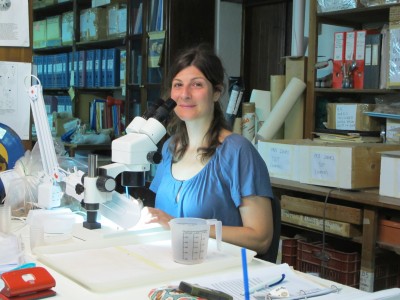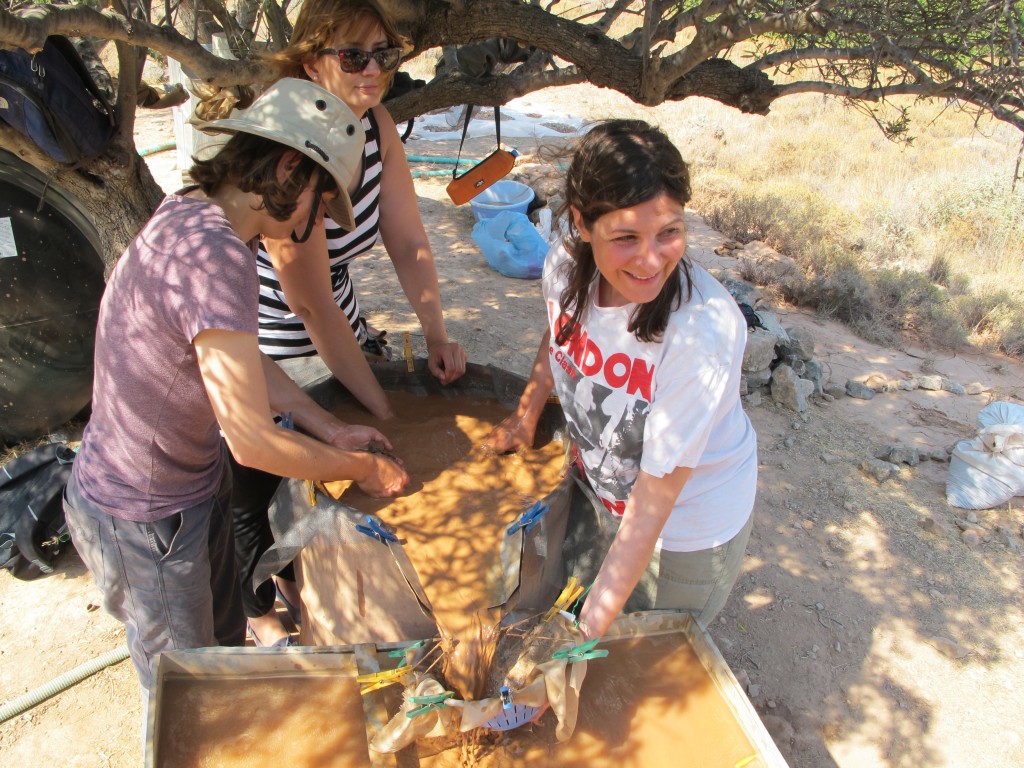
ICAC has welcomed a new researcher through the Ramon y Cajal call (RYC, Spanish state programme).
Dr Alexandra Livarda is an archaeobotanist, focusing on the study of ancient plants, and particularly on food plants to reconstruct not only diet but also trade, social, economic and political relationships and networks in the past.
I’m studying food in the past, and I am particularly interested in exploring the idea of taste. Because taste is not just about flavour, it involves all other senses and, importantly, it is intrinsically cultural: it is about memory, belonging, ambition and so on; when you eat something you remember places, moments, experiences while at the same time you consciously or unconsciously make a statement about who you are.
So, while exploring the idea of taste, we go beyond subsistence. Food has the advantage that is an everyday need. Whatever you do, you have to choose something to eat. You buy clothes and other items now and then but eating is an everyday choice. And it is this choice that can really tell a lot about who you are. You may choose to buy, for instance, fruits because you want to have a healthier diet according to the current perceptions of what a healthy diet is, and not a chocolate cake, you may prefer honey over sugar. In some places in the world certain foods are ‘prohibited’. It’s always about choices. And these choices have always ramifications.
The Universities of Nottingham, Sheffield, Oxford and Leicester in the UK have been some of this prominent researcher’s milestones. Now she is bringing her background, expertise and skills to ICAC to create a new research line on bioarchaeology. Dr Livarda has currently joined the Landscape Archaeology (GIAP) research team, headed by Dr Josep Maria Palet, current director of the ICAC, and Dr Hector A. Orengo.
In her work, Livarda has used plants as proxies to chart social, cultural and economic changes in the past, contributing to significant new and novel interpretations
Dr Livarda’s work centres on two main areas: prehistoric Aegean and Roman and medieval northwestern and western Europe. In regards to the latter, Dr Livarda and her collaborators used exotic food plants as proxies to define the changing social relations from the expansion of the Roman Empire to its downfall, and through to the medieval world. A key study conducted together with Dr Hector A. Orengo, within this framework, was the development of new theories on the Roman food trade in Britain and how this impacted the urbanisation process and the ‘centralisation’ of London.

Multidisciplinary work is a common approach in bioarchaeology since analysis-related tasks combine a lot of different objects and methods. Texts are usually selective and other lines of evidence, such as seeds, animal bones and ceramics, are necessary to be able to reconstruct not only specific events but everyday life in the past, opening thus new windows into our cultural heritage.
In one of my latest projects, at Palaikastro in eastern Crete, I directed a bioarchaeology and palaeoenvironmental team of numerous specialists. We are currently working together in publishing our results that challenge what we know about Minoan Crete to date.
Next February, 19 Dr Alex Livarda will give a public talk about the new evidence and insights provided through her research project PALAP – Palaikastro on the discussion of agriculture, resource management and the development of social complexity in the Minoan society.
The talk will take place in Barcelona in the series of Tribuna d’Arqueologia (full information in ICAC’s Agenda).
The PALAP project combined systematic bioarchaeological sampling with paleoenvironmental and geo-archeological analyses, and landscape survey specifically designed to investigate plant and animal resource management, for the first time in Crete. This holistic approach has provided unique insights into the Minoan socioeconomic organisation.
Last December Dr Alex Livarda was re-elected as a Committee member of the Association of Environmental Archaeology, AEA for the period 2019-2023. She is also a member of the Lefkandi Subcommittee of the British School at Athens.
Dr Livarda co-directed the PALAP Bronze Age excavation project at Palaikastro, Crete (Greece) with Prof. Carl Knappett (University of Toronto, Canada) and Dr Nicoletta Momigliano (University of Bristol, UK) under the auspices of the British School at Athens between 2012 and 2016.
Dr Livarda is currently involved in several projects, including:
- Shedding light on the dark side of the Aegean, Principal Investigator.
- Cova des Pas. Collaboration with the University of the Balearic Islands, Spain.
- Lefkandi, Euboea, Greece. Collaboration with Oxford University, UK (director Prof. Irene Lemos).
- Methone, Pieria, Greece. Collaboration with the ΚΖ’ Ephorate of Prehistoric and Classical Antiquities, Greece, and UCLA, USA (excavation directors Matthaios Besios, Athena Athanasiadou, Konstantinos Noulas, and Prof.s Jon Papadopoulos and Sarah Morris).
Selection of latest publications:
- Wallace, M.; Jones, G.; Charles, M.; Forster, E.; Stillman, E.; Bonhomme, V.; Livarda, A.; Osborne, C. P.; Rees, M.; Frenck, G.; Preece, C. 2019: «Re-analysis of archaeobotanical remains from pre- and early agricultural sites provides no evidence for a narrowing of the wild plant food spectrum during the origins of agriculture in southwest Asia», Vegetation History and Archaeobotany 28(4):449–463. Doi: 10.1007/s00334-018-0702-y.
- Livarda, A. 2019. «Investigating Roman diet through archaeobotanical evidence», in: Erdkamp, P. and Holleran, C. (eds.) The Routledge Handbook of Diet and Nutrition in the Roman World, pp. 51–63. Abingdon and New York: Routledge.
- Livarda, A.; Kotzamani, G. 2019: «An exploration of the social role of plants in rituals in prehistoric Aegean with reference to the site of Xeropolis, Lefkandi, Euboea», in: Lemos, I. S.; Tsingarida, A. (eds.), Beyond the Polis. Ritual, rites and cults in Early and Archaic Greece (12th-6th centuries BC), Études d’Archéologie 15, 289–302, Bruxells: CReA-Patrimoine.
- Livarda A.; Andonova, M. 2019: « Les restes archéobotaniques issus des sondages au bâtiment Dessenne », in: Devolder, M. et al., Le Bâtiment Dessenne et les abords Sud-Ouest du palais dans l’établissement pré- et protopalatial de Malia, Études Crétoises 37, Athens: École française d’Athènes, 307-309.
- Ilkhani, H.; Livarda, A.; Fazeli Nashli, H. 2019: «Archaeobotanical report about Tappeh Sialk, North Mound: first impressions», in: Nokandeh, J.; Curtis, J.; Pic, M. (eds.), Tappeh Sialk. The Glory of Ancient Kashan, 40–44, London: Iran Heritage Foundation.
- Livarda, A.; Madgwick, R.; Riera Mora, S. (eds.). 2018: The Bioarchaeology of Ritual and Religion, Oxbow Books.
- Cañellas-Boltà, N.; Riera-Mora, S.; Orengo, H. A.; Livarda, A.; Knappett, C. 2018: «Human management and landscape changes at Palaikastro (Eastern Crete) from the Late Neolithic to the Early Minoan period». Quaternary Science Reviews183, 59-75.
- Krahtopoulou, A.; Dimoula, A., Livarda, A.; Saridaki, N. «The discovery of the earliest specialised Middle Neolithic pottery workshop in western Thessaly, central Greece», Antiquity92(362), E5.
- Kotzamani, G.; Livarda, A. (corresponding author). 2018: «People and plant entanglements at the dawn of agricultural practice in Greece. An analysis of the Mesolithic and early Neolithic archaeobotanical remains», Quaternary International, volume 496, 80-101.
Short bio:
Dr Livarda is currently a Ramon y Cajal Researcher at ICAC. She obtained her PhD in Archaeology in 2008 at the University of Leicester in the UK, with a thesis on the ‘Introduction and Dispersal of Exotic Food Plants into Europe during the Roman and medieval periods’. Her thesis set the basis of her research career in the archaeology of food and social archaeobotany, on which she has continued working ever since.
Her research overall has focused on four main lines, on which she has published extensively: food and culture; rituals; urban societies and trade; and, the emergence of agriculture. Her research in all these fields has challenged established approaches in archaeology and archaeobotany, leading to the development of new methodologies and theoretical frameworks. In her work, she has used plants as proxies to chart social, cultural and economic changes in the past, contributing to significant new and novel interpretations.
Dr Alex Livarda was a Lecturer at the Department of Classics and Archaeology at the University of Nottingham, UK, one of the higher-ranking Universities in the country, since 2011 and until her incorporation in ICAC, at the end of 2019. This has followed the completion of her PhD in 2008, work as an archaeobotanist, for instance at the Museum of London Archaeology, and three postdoctoral positions at the Universities of Leicester, Oxford and Sheffield (UK).
She has extensive experience directing archaeological and archaeobotanical research. She has published extensively, producing to date 45 outputs, including a book, journal articles, book chapters and book reviews.
Dr Livarda is an appointed committee member of the Lefkandi Subcommittee at the British School at Athens (BSA) and an ordinary member of the BSA since 2012. In 2012 she was also elected as a Committee member of the Association for Environmental Archaeology for the term 2012-2016. Last December Dr Alex Livarda was elected yet another time as a Committee member of the Association of Environmental Archaeology, AEA for the period 2019-2023.
In recognition of her leadership in the field she has been appointed Associate Editor for the journal Environmental Archaeology, a member of the Editorial Advisory Board for the journal Athens University Review of Archaeology (AURA), and a member of the prestigious Arts and Humanities Research Council’s Peer Review College for the period 2017-2020.





